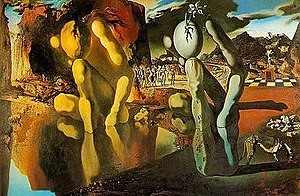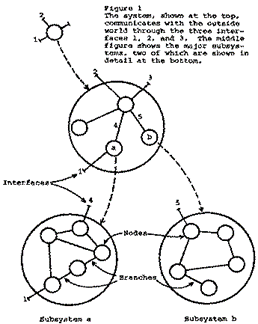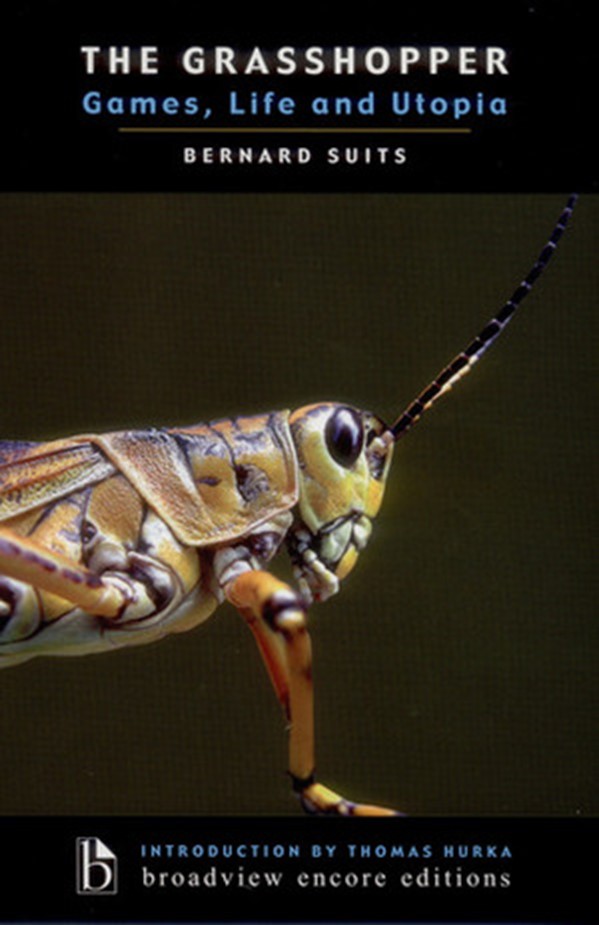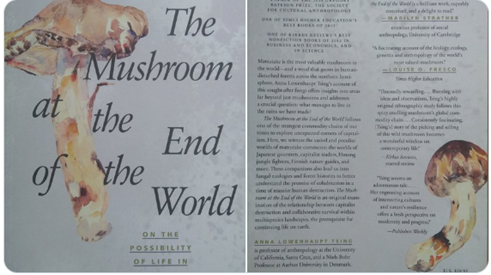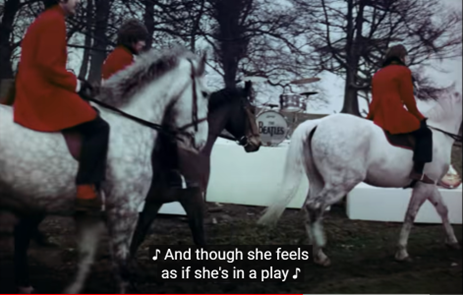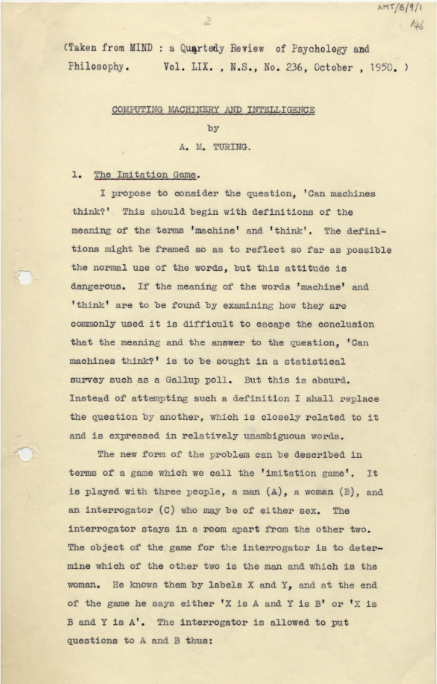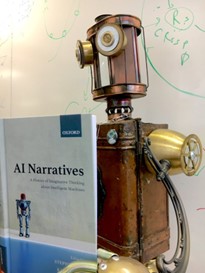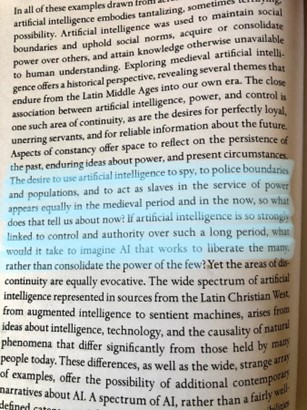Preamble: Worn material, snipped from Twitter and silently mended, but now, on re-reading, patchier than I hoped – unless you can pretend it’s better than it looks and make something more of it? The game is to take the loose threads and weave them back into each other until they’re of a piece.
19 Mar 2021, 4:05 pm
Montreal AI Ethics Institute @mtlaiethics:
“This research summary https://montrealethics.ai/sociological-perspectives-on-artificial-intelligence-a-typological-reading/ surveys the existing sociological literature on AI. It describes a typology of 3 analytical categories — scientific AI, technical AI and cultural AI, which reflect the history of AI development.”
* Nga Than’s research summary is of https://compass.onlinelibrary.wiley.com/doi/pdf/10.1111/soc4.12851 “Sociological perspectives on artificial intelligence: A typological reading” by Zheng Liu, in ‘Sociology Compass’, 2021.
19 Mar 2021, 6:06 pm
Useful article, but I’d like to see a lot more conscious reflection in the discussion of AI.
So what else – between the lines – might be missing…?
Intelligence is such a seductive model of what it is to be human that Artificial Intelligence must be read as games about games about ourselves, a self-directed reading not so far from second-order cybernetics perhaps?
Well…
For any reasonably competent person, these questions would be all the incentive they needed to finish their last post or even the last long unfinished essay before that.
Until then, let’s risk a little “Twitter semaphore”, as David Gunkel would have it…
Or Twitter ping-pong with half a table! As a substitute, in the mirror, turning the tables on ourselves, recursion.
Robert Sanderson’s XII sermons, 1634: “Whosoever thou art that dost another wrong, do but turn the tables: imagine thy neighbour were now playing thy game, and thou his.”
Substitute – The Who, 1966
“I was born with a plastic spoon in my mouth”…
Salvador Dali, 1937 – The Metamorphosis of Narcissus
Intelligence takes some problem we have in mind and reworks part of the world in front of us into the answer. We began by using our body as a tool, or machine part.
Gradually we transferred our intelligence into materials that did the work for us: tool, machine, slave, spirit, friend, colleague, network.
“Artificial Intelligence” isn’t any particular thing: it’s a tendency to transform things, after our own image, making them projections of ourselves.
There’s no such thing as artificial intelligence…?
https://pabloredux.wordpress.com/2015/01/12/theres-no-such-thing-as-artificial-intelligence/
Conway’s Law: “Any organization that designs a system (defined broadly) will produce a design whose structure is a copy of the organization’s communication structure.” http://www.melconway.com/Home/Committees_Paper.html
And these systems always act, directly or indirectly, on ourselves. An implicit goal of any such design will be to manufacture a playable game.
Games… “attempt to achieve a specific state of affairs, using only means permitted by rules, where the rules prohibit use of more efficient in favour of less efficient means, and where the rules are accepted just because they make possible such activity.”
https://nigelwarburton.typepad.com/virtualphilosopher/2007/11/book-review-ber.html
But each social game we play sows the seeds of yet another game.
Goodhart’s Law (per Marilyn Strathern): “When a measure becomes a target, it ceases to be a good measure.”
https://www.cambridge.org/core/journals/european-review/article/abs/improving-ratings-audit-in-the-british-university-system/FC2EE640C0C44E3DB87C29FB666E9AAB
To create a structure is to raise the possibility of its undoing…
Self-hackers, we are the experiment, the target of our own measures, the measure of our own targets…
A troubling example related to Goodhart’s Law is just how (in)effective we seemed to be at gaming our behaviour for/against Covid policies:
https://web.archive.org/web/20230520003405/https://cspicenter.org/blog/waronscience/the-case-against-lockdowns/
(I don’t agree with the initial premise of the piece, but the analysis itself is very useful.)
To create a structure is to raise the possibility of its undoing…
The form of the idea is from a sentence in the book ‘The Mushroom at the End of the World’ that seems central to it (if one can make that claim about a decentred work): “Both matsutake commerce and ecology depend on interactions between scalability and its undoing.”
And so we root among our leftovers – I’ve always been interested in rubbish!
Natural Intelligence, the game, is what we now pursue and rebrand as Artificial Intelligence.
And Artificial Intelligence can take many forms, it doesn’t have to mean “an AI”, an android, a singularity, a superintelligence insanely mining the planet for ever more paperclips.
But it might involve attempting to turn the planet, for a while, into a vast human game-board, a play, an Anthropo-scene in Supermarionation.
“And though she feels as if she’s in a play, she is anyway.”
https://youtu.be/S-rB0pHI9fU
‘The fundamental difference between Burke’s and Goffman’s view, however, is that Burke believed that life was in fact theatre, whereas Goffman viewed theatre as a metaphor.’
https://en.m.wikipedia.org/wiki/Dramaturgy_(sociology)
Supermarionation: ‘A tape deck playing the pre-recorded dialogue would send impulses down the puppet’s tungsten wires (which replaced the strings from previous productions) and into their head, where a solenoid would open and close their lip as required.’
https://web.archive.org/web/20220827160945/https://networkonair.com/features/2021/01/28/supermarionation-at-60/
Am I waving or drowning in Twitter-style semaphore? It was all signalled, nested, in Turing’s 1950 article.
https://academic.oup.com/mind/article/LIX/236/433/986238
He was trying to out-game himself with his Imitation Game: a woman as a man; intelligence as a machine; that all we needed was to learn how to make it play chess or how to make it learn…
But humans embody more than just their intelligence (or stupidity). Left over, but on the table in his article, is a dish of strawberries and cream. To try to make a machine enjoy it would be “idiotic”, says he, conceding but denying it’s an important “disability” (odd word).
All our games act out what it is to be human. Through AI, we are gradually cannibalising ourselves, becoming incorporated as pieces into the action. This is a game about games and as such requires a meta-narrative (but one that doesn’t overlook – or disable – our personal stories).
Perhaps I’ve taken this opportunity to elaborate over-enthusiastically? Nevertheless, returning to the article about the paper, the wider framing I feel we are all resisting is: being intelligent about being intelligent.
But what might that in turn leave out…?
P.S. See side-tweets I’ve added back up the trail for even more of my self-indulgence. (I don’t know who I’m saying that to, but… that’s Twitter/WordPress for you!)
Is there any kind of problem-solving a species can do that doesn’t change anything for them?
The typology paper aimed to help researchers navigate and contribute to the literature on the sociology of AI, which in itself means taking a certain approach to the game, or the genre if you like.
‘The typology emerged from my reading of the existing sociological research on AI. Although I consider it an effective tool with which to approach and navigate the literature, it does not follow that AI can only be sociologically conceptualised in terms of these three categories and must be analysed as either a science or scientific research field, or a meta‐technology or a socio‐cultural phenomenon. There is no reason why “AI” cannot be conceptualised and examined in other senses and from other perspectives–– for instance, as a concept, as a mode of social interaction, as a business circle or as “narrative” (Cave, Dihal, & Dillon, 2020). Eventually, the sociology of AI should aim to examine AI development in all dimensions in which AI technologies interact with social actors, affect social relations, shift social structures and remake social realities––including in ways we may not have the capacity to fully imagine and grasp today. ‘ Zheng Liu https://orcid.org/0000-0002-1203-4297
For me the narrative angle mentioned above has natural self-referential potential, as narrators are creators and editors of their perspectives, although adding the lenses of drama would return emphasis to the action itself.
But this does look an interesting book:
https://global.oup.com/academic/product/ai-narratives-9780198846666
Here’s a handy excerpt:
My feeling is that once the term Artificial Intelligence came into use, it enabled us to go back and back into the past until we can even imagine a pre-history to AI, all of which has begun to “remake social realities” in ways we may not yet have fully grasped?
Nga Than’s review – which began this thread – ends with a proposal to “move away from the Western-centric perspective to examine AI in the Global South”.
Perhaps one way of doing this is to reimagine AI from a different starting point altogether – as a vortex that has spun away from our ancestors and is heading north-northwest?
2 Apr 2021, 2:55 pm
(edited, for the record, 11th October 2023, 12:26 pm – 12th October 2023, 15:26 pm)
Postamble: Did any of that work for you? I’m not sure how well integrated Conway’s Law was – perhaps there are conditions where the “Law” no longer holds? But the design of a game probably does reflect the manner in which the designers were (or weren’t) able to talk to each other, so it could even apply to games in life which have evolved without an overall design. And when we next find ourselves having to “play the game”, perhaps remembering Conway’s Law may help us reflect on how this state of affairs ever came to be.

